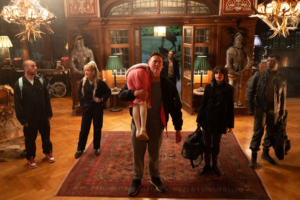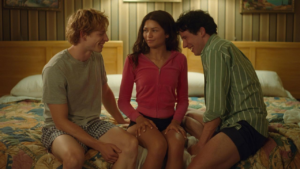Reviewed by GREG KING
Documentary
Director: Gabriela Cowperthwaite.
Like thousands of tourists before me, I have visited the Sea World theme parks in San Diego and Florida, and marveled at the antics of the trained whales as they leap out of the water and cavort with their trainers. But this fascinating documentary is an eye opener and shows these theme parks and their questionable practices in a new light.
In 2010 the orca Titikum killed veteran trainer Dawn Branchau at the Sea World theme park in Florida. Park offcials blamed Branchau herself for causing the accident, saying that her ponytail was caught. Security footage from the park though shows the whale grabbing Dawn’s arm and dragging her underwater. This incident is the starting point for this provocative and disturbing documentary from filmmaker Gabriela Cowperthwaite that raises questions about the ethics of keeping these intelligent and beautiful creatures in confined spaces purely for entertainment.
The film reveals that this was the third such death that Titikun had been involved with in nearly twenty years, and exposes the systemic cover-up by the corporations that own the theme parks. Cowperthwaite obviously has a point to make about the cruelty of the exploitation of animals purely for entertainment purposes, and does so quite forcefully.
Cowperthwaite studied political science before becoming interested in media, and this shapes her work as a filmmaker. She interneed on a documentary about the war in Iraq, and co-produced the documentary series Shootout! for the History Channel. She began the film with the intention of exploring that delicate relationship between man and animal, but what she discovered began to shape the documentary, which slowly evolved over a two year period. Working with editor and co-writer Eli B Despres, she uses plenty of archival footage to detail Titium’s history, from his capture at sea in 1983 to his involvement in three deaths. And some of the footage is truly disturbing and upsetting.
Sea World has put its own spin on these deaths, shielding the whale itself from much of the blame, instead shifting the responsibility for the “accidents” onto the victims. And, as the film points out, the trainers at Sea World were unaware of his involvement in the previous deaths.
There are a number of deeply emotional interviews with experts and a number of former trainers who obviously have a great affection for these creatures. Even though they have reservations about the processes of the theme park, they keep working with the whales because they genuinely love the animals. And according to these experts there are no reports of a killer whale harming people in the wild. They talk at length of some of the problems of keeping these killer whales in captivity, and detail the misinformation put out by the theme parks themselves about whales and their behaviour.
For the theme parks it is all about the money they make from merchandise. Yet they remain oblivious to the danger posed to those people who daily work with the whales. There are revelations of the whales being deprived of food as punishment, and of their anxiety at being confined in living spaces that are far too small for them. Most telling of all though is the fact that the corporate heads of Sea World declined to be interviewed for the film.
The treatment of whales in these theme parks was the basis for the fictional film Free Willy, a crowd pleasing drama with a heartfelt message about animal cruelty. Like the disturbing Oscar winning documentary The Cove, Blackfish is a powerful and informative animal advocacy documentary that similarly makes its point with chilling effectiveness. Blackfish is a film that should make you angry and sad.
★★★★




